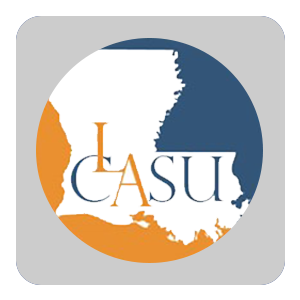Louisiana Center Addressing Substance Use (LaCASU)
The Louisiana Center Addressing Substance Use in Collegiate Communities (LaCASU) office provides outreach and support to Louisiana’s institutions of higher education to aid in reducing the negative consequences of substance use. Through the Louisiana Higher Education Coalition (LaHEC), a project funded by the Louisiana Department of Health — Office of Behavioral Health (OBH), we facilitate a statewide coalition of over 35 institutions of higher education across Louisiana, including four-year institutions, two-year institutions, community colleges, and technical community colleges.

Within LaHEC’s structure, we are able to provide the following free services:
- Research and Evaluation services include providing statewide assessment and evaluation of substance use rates of Louisiana’s college students through the Core Alcohol and Drug survey. Additionally, we assist higher education administrators in raising awareness about healthy and helping behaviors and selecting intervention strategies that reduce negative consequences.
- Professional Development training to increase evidence-based prevention programs, help in organizing campus community coalitions, and provide seminars to present information on best practices on current issues in higher education;
- Technical Assistance to help establish data-tracking systems, institutional assessments of ATOD practices, and assistance in survey administration and reporting. In addition to the aforementioned, we also serve as the primary source of professional expertise in collegiate substance use prevention in Louisiana through advisory boards/councils such as the State Epidemiology Workgroup (SEW) and Prevention Systems Committee (PSC).
About LaCASU
History
The Louisiana Center Addressing Substance Use (LaCASU) was developed as a result of Louisiana State Univerisity’s participation in an institutional study titled, “A Matter of Degree” (AMOD). In 1998, LSU was one of ten schools selected for this project. This selection followed the 1997 drinking death of an LSU student. LSU received funding from the Robert Wood Johnson Foundation (RWJF) for participation in a five-year grant project administered by the American Medical Association and evaluated by the Harvard School of Public Health. The ten schools, all with high binge drinking rates, applied a campus-community environmental model to their alcohol prevention efforts. Each was required to initiate a campus-community coalition; to target areas which included community policy, better enforcement of alcohol laws, alcohol advertising, campus alcohol education, on-and off-campus living environments, and campus alcohol policy; and the ten schools tracked their progress by administering a yearly alcohol/drug survey to a sample of students.
After the initial five-year study, LSU was provided with funding from RWJF to extend the study another three years. The description and results of the study can be found on the College Alcohol Study website.
In 2002, the Louisiana Higher Education Coalition (LaHEC) was established to serve as a statewide network of institutions of higher education and key community and statewide stakeholders. The intended purpose was to replicate the campus-community coalition mechanism and implementation of environmental prevention strategies (per requirement for 2003-2007 AMOD funding). LaHEC is managed by the LaCASU office.
In 2006, at the end of the eight-year period with the “A Matter of Degree” grant-funded study, two LSU Coalition partners, the Office for Behavioral Health of the LA Department of Health and Hospitals and the Louisiana Highway Safety Commission, extended funding to the LSU project to expand the environmental model to other institutions of higher education in Louisiana, to continue the work of the Baton Rouge area campus-community coalition, and to fund the statewide administration of the Core Alcohol Survey.
After 20 years at LSU, the LaCASU office moved to the Louisiana Board of Regents and is currently funded by the Louisiana Department of Health — Office of Behavioral Health.
Mission
The mission of LaCASU is to foster safe and healthy collegiate communities by reducing problems associated with students’ substance use through collaboration among institutions of higher education and key community and state stakeholders. LaCASU offers a range of services that are centered around: (1) Research and Evaluation, (2) Professional Development, and (3) Technical Assistance.
Research and Evaluation
Through the Core Survey data that is collected, recommendations are made to various community coalitions and statewide task forces on data prioritization and possible environmental intervention solutions. Core Survey data has been used to produce a statewide data brief on behalf of the State Epidemiology Workgroup (SEW), develop a bystander intervention training program for collegiate and high school populations, develop a parish-wide social norms campaign in Tangipahoa parish, and write a grant for Transforming Youth Recovery to secure a $10,000 grant for collegiate recovery at Louisiana State University. Additionally, data from the Core Survey also helps to shape the statewide conversation on substance abuse prevention, treatment, and recovery through LaCASU’s involvement with the Governor’s Advisory Council on Heroin and Opioid Prevention Education (HOPE Council) and the Prevention Systems Committee (PSC).
Professional Development
Through the LaHEC grant, we annually provide multiple professional development opportunities for higher education staff around the best practices regarding environmental strategies to reduce the negative consequences of substance use. One of the professional development opportunities we offer includes an annual summit held in Baton Rouge as well as technical assistance to all of Louisiana’s institutions of higher education that request it (based on capacity and availability). These services are offered free of charge to the institutions.
Technical Assistance
We provide technical assistance to Louisiana’s higher education institutions through two means: regional trainings and individual institution trainings. Through our grant, we perform traditionally perform these during even years, conducting up to ten (10) regional trainings and up to 25 individual institution trainings (on topics including bystander intervention, compliance with federal substance use reporting, and social norms).
Resources
Local and National Resources
- Transforming Youth Recovery Community Asset Map
- Higher Education Center for Alcohol and Drug Misuse Prevention and Recovery
- Association of Recovery in Higher Education (ARHE)
- Louisiana Social Indicators (a website that allows users to view charts and maps of indicators that will be useful in planning and evaluating substance abuse prevention efforts)
- Caring Communities Youth Survey (CCYS) (a biennial statewide assessment of students’ involvement in a specific set of problem behavior while looking at scientifically validated risks and protective factors with responses from more than 113,000 6th, 8th, 10th, and 12th graders from across Louisiana)
- Center for Substance Abuse Prevention (CSAP)
- Substance Abuse and Mental Health Services Administration (SAMHSA)
- Drug-Free Schools and Communities Act (DFSCA) and Drug and Alcohol Abuse Prevention Regulations (EDGAR 86)
- National Social Norms Institute
- Harvard College Alcohol Study Archive
- I CARE
- MADD (Mothers Against Drunk Driving) – Louisiana Profile
- Louisiana Highway Safety Commission
- Louisiana Public Health Institute
- Louisiana Addictive Disorder Regulatory Authority (ADRA)
- CADCA
- East Baton Rouge Parish Sheriff’s Office
- Office of National Drug Control Policy
- AA – Alcoholic Anonymous
- Smart Recovery
Drug Free Schools and Campuses Act (DFSCA)
The act was codified with the 1986 Safe and Drug-Free Workplace Act initiated by Congress in 1989. DFSCA is articulated in the Education Department General Administrative Regulations (EDGAR) Part 86 (common reference) —the Drug-Free Schools and Campuses Regulations and pertains to “Drug and Alcohol Abuse Prevention.”
DFSCA recognizes the serious negative consequences of drug and alcohol use on academic performance, student well-being, and campus prevention efforts. This requires higher education institutions to actively (affirmative consent) notify all students, faculty, staff, and other employees to be notified annually of the pertinent alcohol and drug laws on the following levels: federal, state, local city/parish, and the campus through an Annual Notification.
Additionally, campuses must complete a Biennial Review, which assesses the previous two years of substance use-related policies, practices, and programs on campuses. This document serves as a chance to inform a larger campus audience of ongoing programs and identify areas of concern. The biennial review must be “certified” by the highest-ranking campus-level official via signature. Once the document has been signed, physical copy locations and online sites designated within the report to access the report should have a copy where specified. Certification must happen at a minimum of every five (5) years, although we encourage institutions to get a new signature with each new report or when there is an employment status change in the person who certifies.
The biennial review is not often sought out on its own. Still, it must be produced upon request by the U.S. Department of Education (through their national random checks) or in any Title IX, financial aid, or other campus investigation that arises. The current penalty for not having an up-to-date biennial review report is $54,000, roughly the salary of at least one full-time employee on any campus in Louisiana.
Biennial Review
In addition to an annual notification, the DFSCA requires that campuses complete a Biennial Review, which assesses the previous two years of substance use-related policies, practices, and programs on campuses. This document serves as a chance to inform a larger campus audience of ongoing programs and identify areas of concern. The biennial review must be “certified” by the highest-ranking campus-level official via signature. Once the document has been signed, physical copy locations and online sites designated within the report to access the report should have a copy where specified. Certification must happen at a minimum of every five (5) years, although we encourage institutions to get a new signature with each new report or when there is an employment status change in the person who certifies.
Based on a 2014 summit presentation from Dr. Eric S. Davidson from Eastern Illinois University and the Illinois Higher Education Coalition (IHEC), we have provided templates to help institutions complete their federally mandated reporting.
The handbook Complying with the Drug-Free Schools and Campuses Regulations can be found here, while the suggested biennial review template can be found here, and the certification template can be found here.
If your institution would like to request on-campus training on the DFSCA, please email the LaCASU office.
Annual Notification
The DFSCA recognizes the serious negative consequences of drug and alcohol use on academic performance, student well-being, and campus prevention efforts. This requires higher education institutions to actively (affirmative consent) notify all students, faculty, staff, and other employees to be notified annually of the pertinent alcohol and drug laws on the following levels: federal, state, local city/parish, and the campus through an Annual Notification.
Based on a 2014 summit presentation from Dr. Eric S. Davidson from Eastern Illinois University and the Illinois Higher Education Coalition (IHEC), we have provided templates to help institutions complete their federally mandated reporting.
The handbook Complying with the Drug-Free Schools and Campuses Regulations can be found here, while the suggested annual notification template can be found here.
If your institution would like to request on-campus training on the DFSCA, please email the LaCASU office.
About LaHEC
LaHEC

Established in 2002, the Louisiana Higher Education Coalition (LaHEC) serves as a statewide network of institutions of higher education and key community and statewide stakeholders.
The intended purpose was to replicate the campus-community coalition mechanism and implementation of environmental prevention strategies (per requirement for 2003-2007 AMOD funding).
LaHEC provides technical assistance for establishing coalitions and offers professional development regarding collegiate alcohol, tobacco, and other drug prevention. Additionally, LaHEC facilitates the statewide administration of the Core Alcohol and Drug Survey.
The mission of LaHEC is to foster safe and healthy campus communities by reducing problems associated with alcohol, tobacco, and other drug use by college students through collaboration among institutions of higher education and key state and community stakeholders.
This is achieved through the following actions:
- Establish and stabilize campus-community coalitions throughout Louisiana.
- Establish data-tracking systems, conduct assessments, administer surveys, and report results.
- Provide professional development training to increase evidence-based prevention programs.
- Stabilize active LaHEC membership to include all institutions of higher education in Louisiana.
- Stabilize community and state stakeholders and continue funding for LaHEC.
Individual Institution and Regional Trainings
Individual Institution Trainings
This technical assistance feature is available upon request to individual campuses who request on-site training for a campus-specific issue. Currently, our office is offering two types of training: bystander intervention (to increase active bystander participation in high-risk substance use scenarios) and the Drug Free Schools and Campuses Act (DFSCA, also known as biennial review and annual notification).
If you would like to request training on your campus for one of the topics above, please email the LaCASU office.
Regional Trainings
These trainings take place during the year that the Core Alcohol and Drug Survey is not administered (even years). Possible regional training locations are determined by the OBH regional map and consist of the following locations: New Orleans, Baton Rouge, Houma/Thibodaux, Lafayette, Lake Charles, Alexandria, Shreveport, Monroe, and Hammond.
Designed with a more intimate setting in mind, these trainings allow local higher education to interact with their local prevention, treatment, and community coalition members to focus on regional issues identified through Core survey data. We work hand-in-hand with the various Local Governing Entities (LGEs) that provide prevention, treatment, and recovery services in each region. Understanding the expertise the LGEs bring to our trainings, they are charged with securing a community location for the training and developing the community side of the invite list (while we take care of the higher education partners in the region).
If you would like to request bystander intervention training on your campus, please email the LaCASU office.
Core Alcohol and Drug Survey
Core Data Results
Regional results are reported by the nearest metropolitan area city. Only regions with more than one participating school will have a regional report, except for 2023, for which there are no regional reports available.
2023 Core Survey Results – Executive Summary Report
2021 Core Survey Results – Executive Summary Report
- Region 1 – New Orleans
- Region 2 – Baton Rouge
- Region 3 – Houma/Thibodaux
- Region 4 – Lafayette
- Region 7 – Shreveport
- Region 8 – Monroe
- Region 9 – Hammond
2019 Louisiana Consortium Results
- Region 1: New Orleans
- Region 2: Baton Rouge
- Region 4: Lafayette
- Region 7: Shreveport
- Region 8: Monroe
- Region 9: Hammond
2017 Louisiana Consortium Results
- Region 1: New Orleans
- Region 2: Baton Rouge
- Region 4: Lafayette
- Region 7: Shreveport
- Region 8: Monroe
2015 Louisiana Consortium Results
- Region 1: New Orleans
- Region 2: Baton Rouge
- Region 4: Lafayette
- Region 7: Shreveport
- Region 8: Monroe
For a more comprehensive listing of regional and statewide results, please visit LA Social Indicators (powered by Bach-Harrison) or contact our office for specific state or regional reports from 2007 – 2013.
Administration Process and Forms
The standard surveys offered by the Core Institute quantify and document college students’ attitudes, perceptions, and opinions about alcohol and drugs. The surveys also measure behaviors of actual AOD use and the consequences of use. The target audiences of the products and services offered by the Core project are college presidents, administrators, counselors, and others involved in student life and the quality of the college campus environment. To date, the Core Alcohol and Drug Survey has the largest database on alcohol and other drug use at post-secondary educational institutions. More information about the Core Alcohol and Drug Survey can be found here.
The 2025 Louisiana Consortium will conduct its 10th administration of the Core Alcohol and Drug Survey from January 27 – February 7, 2025. The forms necessary to complete the administration process can be found below.
2025 Core FORM 1 – Release of Data
2025 Core FORM 2 – Survey Methods
2025 Core FORM 3 – IRB Packet – ONLINE
2025 Core FORM 3 – IRB Packet – PAPER
2025 Core FORM 3A – NO FORMAL IRB
2025 Core FORM 3B – Informed Content Template (Schools with no IRB)
2025 Core FORM 4 – Student Sample Status
2025 Core FORM 5 – Administration Protocols
If you have any questions about participation in the 2025 Core Survey administration, please contact our office at [email protected] or 225-342-4253.

Educate, Innovate, and Collaborate
The Master Plan
To move Louisiana aggressively forward, the Board of Regents has embraced a robust new attainment goal that calls for 60% of all working-age adults (ages 25-64) in Louisiana to hold a degree or high-value credential by 2030. As we stand on the brink of a new decade, this Master Plan, born of the Board of Regents’ unique charge to guide postsecondary education across the state, will set the foundation to increase opportunity. Our Talent Imperative is to Educate, Innovate, and Collaborate